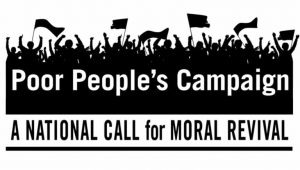(ThyBlackMan.com)
Then he will say to those on his left, ‘Depart from me, you who are cursed, into the eternal fire prepared for the devil and his angels. For I was hungry and you gave me nothing to eat. I was thirsty and you gave me nothing to drink. I was a stranger and you did not invite me in. I needed clothes and you did not clothe me. I was sick and in prison and you did not look after me.’
They also will answer, Lord, when did we see you hungry or thirsty or a stranger, or needing clothes or sick or in prison, and did not help you? He will reply, ‘I tell you the truth, whatever you did not do for the least of these, you did not do for me.’ Matthew 25:41-45
Fifty years ago, Dr. King called for a Poor People’s Campaign to push for an Economic Bill of Rights. The plan was to bring poor people to Washington in the summer of 1968 to dramatize the lack of jobs, education and housing affecting poor communities of all races. King saw this as the next phase of the Civil Rights movement, moving “from the era of civil rights to an era of human rights.” King’s assassination in April of 1968 happened before the campaign was to get underway.
Now, fifty years later, the Reverend William Barber and Reverend Liz Theoharis, have launched a new Poor People’s Campaign. Although it did not receive nearly enough news coverage, the campaign kicked-off on Monday May 14th in several cities across the country. Rallies are planned each Monday for the next six weeks culminating in a gathering in Washington on June 23rd. In addition to what the original campaign sought, this new campaign also calls for better healthcare and public transportation and relief from “crushing student debt” affecting many young people.
Although it did not receive nearly enough news coverage, the campaign kicked-off on Monday May 14th in several cities across the country. Rallies are planned each Monday for the next six weeks culminating in a gathering in Washington on June 23rd. In addition to what the original campaign sought, this new campaign also calls for better healthcare and public transportation and relief from “crushing student debt” affecting many young people.
Today, the issues of poverty are mainly discussed in terms of “entitlement reform” and the need for work requirements as a prerequisite for benefits. But the questions of who is poor in America and who are the beneficiaries of the most government assistance do not receive adequate attention.
United Way organizations in 18 states have just released data they collected on poverty in America under what they collectively call the ALICE Project (www.unitedwayalice.org): Asset Limited Income Constrained Employed. These are people who are above the poverty line but whose income is below the cost of paying ordinary middle-class living expenses like rent, transportation and child care. According to their study, 51 million households, or 43% of all households in the country fall into this category. In some states, like California, ALICE households are as high as 49% of all households in the state. Clearly this cuts across all racial and ethnic lines and puts a different face and perspective on poverty in America.
When the three richest men in America control as much wealth as the bottom 50% of the population combined and when CEOs make an order of magnitude of a hundred times, or more, than their average workers earn, we know that income inequality is widespread. But when poverty is masked as a problem exclusively for “blacks, Hispanics or undocumented immigrants”, it makes the general public less sympathetic and less likely to demand that the government help. And the meager assistance some people get from Temporary Assistance for Needy Families (welfare) and the Supplemental Nutrition Assistance Program (food stamps), does not come close to the “corporate welfare” handed out in the form of trillion dollar tax cuts and other subsidies. As for having to work to receive government benefits, the cut in the estate tax confers additional wealth on people who did not work for it at all.
Like Dr. King before him, Reverend Barber has called for a “moral revolution.” An ethical proposition that states, in the face of such an abundance of wealth in our country, no child should go hungry and no family should be homeless. That your birth zip code should not be an arbiter of your future status and the opportunity to obtain a quality education that will allow you to earn your way should be guaranteed: K-16. That healthcare will be available when you need it and that prisons will not exist merely to provide jobs for rural (white) people to “guard” incarcerated urban (black and brown) people.
Isn’t that the meaning of the passage from Matthew in the New Testament? That a righteous and just society cares for those in need, and does not cast blame for their being in need. And that this care is to be extended even to the “stranger”, or someone who may not be of your ethnicity or nationality. If we can get to this, we will understand what Khalil Gibran meant when he said, surely “he who has deserved to drink from the ocean of life deserves to fill his cup from your little stream.” And if not, we are cursed to live in a society rife with tension and strife. Where the strong exploit the weak and the wealthy lock away their abundance from the poor.
We may say we believe the former when in fact we practice the latter. That’s why I’m glad to see a resurrection of the Poor People’s Campaign. So that we can remind the rich and powerful to practice what they, and their gatekeepers, preach to the rest of us.
Staff Writer; Harry Sewell

















Leave a Reply